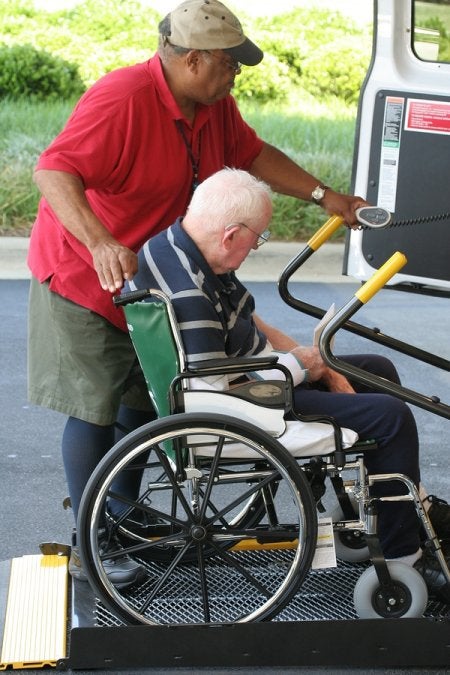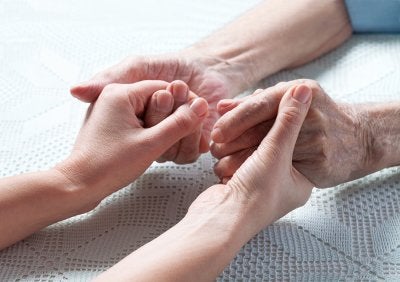-
5 Tips for Stimulating the Appetites of Alzheimer’s Patients
Caring for elderly patients can be challenging, especially when they are affected by Alzheimer’s disease. This common form of dementia often causes the loss of appetite and, subsequently, unintended weight loss. Significant weight loss can bring its own health complications. If you’re having trouble coaxing your loved one to eat regularly, an in-home caregiver in Memphis may be able to help. Reduce mealtime distractions.Sometimes, people with Alzheimer’s have trouble during mealtimes because the environment is too cluttered or noisy, or because they cannot multitask well. Turn off the TV and radio at mealtimes, and clear the table of clutter. If these steps aren’t sufficient to convince the individual to eat, try serving just one or two types of food at a time.Keep your loved one company during meals.People are social creatures and often prefer to eat in the company of others. If it isn’t possible for you to sit with your loved one during each meal, it may be time to hire an elder care provider to give your loved one the companionship and practical care he or she needs. When you are able to dine with your loved one, make eye contact and convey positivity with your facial expressions. Your loved one may be more likely to eat if you are eating, too. Some individuals may do better with quiet, pleasant conversation, while others are too distracted by talking.Make eating as easy as possible.
Reduce mealtime distractions.Sometimes, people with Alzheimer’s have trouble during mealtimes because the environment is too cluttered or noisy, or because they cannot multitask well. Turn off the TV and radio at mealtimes, and clear the table of clutter. If these steps aren’t sufficient to convince the individual to eat, try serving just one or two types of food at a time.Keep your loved one company during meals.People are social creatures and often prefer to eat in the company of others. If it isn’t possible for you to sit with your loved one during each meal, it may be time to hire an elder care provider to give your loved one the companionship and practical care he or she needs. When you are able to dine with your loved one, make eye contact and convey positivity with your facial expressions. Your loved one may be more likely to eat if you are eating, too. Some individuals may do better with quiet, pleasant conversation, while others are too distracted by talking.Make eating as easy as possible.As Alzheimer’s disease progresses, managing eating utensils becomes more difficult. An elder care provider can prepare meals that work well as finger foods. Instead of salad, serve crudité. Instead of grilled chicken breast, serve chicken strips.
Serve smaller meals and snacks frequently.
It’s not always practical to expect a person with Alzheimer’s to eat a large meal. It’s often more feasible to gently coax him or her to eat small snacks between meals. Try serving nutritional supplement drinks or soft foods, such as eggs, pudding, or smoothies.
Prepare your loved one’s favorite foods.
Nutritious, well-balanced meals are important, but sometimes, it’s better to choose your battles wisely. Preparing your loved one’s favorite meals, even if they aren’t particularly healthy, can help stimulate his or her appetite.
-
A Quick Look at Discharge Planning
After a loved one is discharged from a hospital or long-term care facility, families need to know that there is a risk of re-admittance to the hospital, particularly when the patient is a senior citizen. Careful discharge planning can reduce this risk. Discharge planning involves identifying the patient’s post-discharge needs and connecting the patient to the necessary resources. For example, it’s a good idea for family members to contact a home health agency in Memphis before the patient is discharged. An assisted living provider can ease the transition from the hospital to the home.
When you consult an in-home caregiver, you’ll learn what to expect when your loved one returns home and you’ll discuss ways of overcoming challenges. The assisted living provider may recommend home modifications to improve safety, for instance. A caregiver’s versatility can prove invaluable for your family. He or she can provide assistance with personal care, light housekeeping, meal preparation, and transportation to follow-up medical appointments.

-
Why Do Cancer Patients Need Transportation Assistance?
Unless a close family member has been diagnosed with cancer, it is often difficult for individuals to fully grasp the extent of the needs of these patients. Quite often, families dealing with cancer discover that they require in-home care provided by Caring Companions in Memphis. An assisted living provider can help cancer patients with a wide range of needs, including transportation to the dozens of doctor’s appointments that follow the diagnosis. Cancer patients may have multiple appointments in just one week for medical testing, oncology consultations, injections, and chemotherapy. If they are going through a round of radiation therapy, they will need to get to the radiation therapy clinic every day.
It’s difficult for families to meet the many demands of cancer treatment. It is often necessary to arrange transportation from an assisted living provider because cancer patients cannot drive themselves to and from appointments for several reasons. Patients are usually taking powerful painkillers, which prevents them from driving. They are also likely to experience debilitating side effects from cancer and its treatment. In some cases, the patient may have significant mobility deficits and cannot get around the house by him- or herself, let alone drive a vehicle. But with transportation assistance, cancer patients can safely get to where they need to go for their care.

-
Tips for Solving Sibling Disputes About Care Plans for Parents
When aging parents begin to develop functional limitations or poor health, it’s time to discuss elder care if you haven’t done so already. Of course, if your parents are still mentally capable, they will make the decisions regarding their own assisted living services. But if you and your siblings are responsible for making these decisions, disagreements can easily arise regarding the best way to care for elders in Memphis .

Identify Underlying Conflicts
Before you can develop a workable solution for sibling disagreements, it’s helpful to assess whether there is an underlying conflict. Siblings have a shared history that may contain unpleasant memories and rivalries. It’s challenging to address complex needs like in-home care and siblings can readily revert back to their childhood roles. Have a frank discussion with your siblings. Acknowledge that family dynamics may not be ideal, but that mom and dad need everyone to be on board with their care plan.
Request a Neutral Assessment
Another effective strategy is to introduce the guidance of a neutral third-party such as a professional in-home caregiver. Asking for a professional assessment of your parents’ needs is particularly helpful when you and your siblings disagree about the type and extent of care services your parents need. Perhaps the sibling who lives closest to mom and dad understands that their personal hygiene and housekeeping have been neglected, but siblings who live farther away aren’t convinced that these problems exist. Professional guidance can help all of the siblings gain a clearer understanding of the needs of the parents.
Establish Open Communication
Another common sibling dispute regarding elder care plans occurs when one adult child feels that he or she is shouldering an unfair amount of the work. Perhaps the other siblings live too far away to provide care or perhaps they simply aren’t comfortable in a caregiving role. It’s important to communicate these issues openly, rather than let resentment build up. The sibling who is performing most of the work might ask the other siblings to pay for respite care, for example. It’s to be expected that the parents’ needs will change over time. The sibling who is closest to mom and dad should make an effort to keep the others informed of any major changes.
-
Get the Facts About Vascular Dementia
There are many different forms of dementia that may require a person to consider elder care assistance. Home health companies near Memphis often work with individuals who have vascular dementia , which is second to Alzheimer’s disease in terms of prevalence. When you watch this video, you will learn that vascular dementia is the result of interference with the blood supply to the brain. When the brain cells are deprived of the life-giving blood they need, they begin to die off. This irreversible damage gives rise to vascular dementia.
A person receiving assisted living care because of vascular dementia may display problems such as confusion, mobility impairment, agitation, or the loss of urinary control. The impairments depend on the area of the brain that sustained damage. There are ways of reducing the risk of vascular dementia, which you’ll learn about from this featured video.
-
A Step-by-Step Guide to Dementia Care
When a loved one is diagnosed with dementia, making a care plan is one of the most important first steps to take. Ultimately, depending on the type of dementia, your loved one may need occasional assisted living services, in-home care, and ultimately hospice in Memphis for his or her comfort and safety. Whether your loved one has Alzheimer’s disease or another form of dementia, here is a closer look at the steps involved in providing care.

In the early stages of dementia, your loved one may only need occasional help with things like cooking and cleaning that can become dangerous for someone with dementia. People with dementia that can benefit from assisted living services are usually have mild symptoms and are still able to provide most of their own care. Assisted living support from a home care aide can supplement the care provided by your family as much or as little as you prefer, in accordance with your schedule and your loved one’s needs.
Around-the-clock in-home care is the next step in most dementia care plans. This level of care becomes necessary when it is no longer safe for your loved one to be home alone. An in-home care aide can assist with meal preparation, cleaning, errands, medication reminders, and companionship. He or she can keep your loved one feeling safe and secure. Again, full-time in-home care schedules can be tailored to meet the specific needs of your family.
When your loved one is in need of end-of-life care, trained hospice care providers can support your entire family while ensuring your loved one is comfortable. Many people who get hospice care for a loved one are grateful for the support they received and the ability to be able to focus on spending time with their loved one at the end of his or her life. Hospice care providers can work with your loved one’s medical team to ensure that he or she has everything they need to be peaceful and comfortable.
-
Planning for Recovery from Back Surgery
Back surgery is a serious procedure that typically involves a lengthy recovery. You or your loved one may spend a period of time in an in-patient treatment facility before transitioning to care at home. Having a plan for recovery that includes a plan for an in-home caregiver in Memphis and the appropriate assisted living services before the surgery is essential, so you can avoid being forced into making rushed decisions at a stressful time. If back surgery is on your schedule, here are some ways to plan for your recovery.

Get Recovery Supplies
After back surgery, it may be necessary to rely on medical devices, such as a walker, cane, toilet chair, and shower bars. Get these items before the procedure so they are set-up and ready to be used. The back surgeon will also provide prescriptions for pain medications and in some cases, antibiotics that can be filled before surgery. It is very important to stay on top of pain medication doses and refills, so that there is no risk of running out of the medications.
Make a Plan for Caregiving
Whether you or your loved one go straight home after surgery or spend time in a in-patient facility, it will be necessary to have in-home caregiving for an extended period of time. Decide how much care can be provided by family members, if any, and when you will need a home care aide to give assistance. Set up a schedule that includes the right mix of assisted living care provided by an in-home caregiver and care provided by loved ones.
Focus on Transition Care
The time in which patients leave the hospital and return home can be especially dangerous and demanding after back surgery. The risk of falling is high, and patients need assistance with everything from personal hygiene to transportation. Hiring a home care aide for transition care helps families feel confident that their loved ones always have the assistance they need during this crucial part of recovery.
-
What to Expect After a Hip Fracture
A hip fracture can be a painful and debilitating injury that requires a lengthy recovery. Generally, people can benefit from having an in-home caregiver to assist during their recoveries, when their mobility may be limited. Here is a look at what you can expect while you recover from a hip fracture and how in-home care in Memphis may be helpful.

Rehabilitation
After surgery to repair your hip fracture , you will undergo physical therapy during rehab in the hospital where you had your surgery or in a rehab facility. This physical therapy is designed to help you regain some basic mobility and begin to rebuild the muscles that will support your repaired hip. Usually, you will not be allowed to return home until you can confidently go up and down the stairs. You may be surprised how quickly you are out of bed and moving around, but this is actually an important part of your recovery. In most cases, patients can avoid complications associated with hip fracture surgery by walking as soon as possible.
Transition Care
When you return home from surgery, there are still many activities you won’t be able to do on your own. During this time, transition care provided by an in-home caregiver can be helpful, especially if your loved ones must work during the day. An in-home caregiver can help with everything from personal hygiene needs to cooking and light housework. A transitional caregiver can also be present to help you stick to the recovery plan recommended by your surgeon, including getting up and walking around at regular intervals. You won’t be able to sit for longer than 45 minutes without getting up and moving. A physical therapist may also come and visit you in your home during this time.
Return to Normal Activities
The rate at which patients can return to their normal activities varies. If you work an office job, you may return to work within six to eight weeks of surgery. You may not be able to return to physically demanding activities until three to six months after your procedure. Your surgeon will carefully monitor your recovery and advise you when you can resume your activities.
-
Steps to Take When a Loved One Dies at Home
Individuals who are in hospice care are often more comfortable living out the rest of their lives at home. The majority of end of life caretaking in Memphis may be handled by hospice professionals and by an in-home caregiver from a private agency. The primary family caregiver, who is usually the spouse or an adult child, will need to have a checklist of steps to take when the individual passes on.

Locate the DNR
It is likely that your loved one would have a “do not resuscitate” (DNR) order if he or she is in hospice care. You will need to know about this as soon as your loved one enters into hospice care. The DNR is a document that must be issued by a physician. It instructs healthcare providers and/or first responders not to initiate resuscitation efforts in the event that the individual displays cardiac or respiratory arrest. Without a DNR, healthcare providers are required to perform cardiopulmonary resuscitation (CPR). This results in a distressing situation for the surviving family members.
Call Hospice and the Caregiver Agency
After a loved one dies at home , there is usually no need to act immediately. You may wish to sit with your loved one in quiet reflection or you may need to go elsewhere in the home to gather yourself. When you’re ready, call the hospice care team and the private caregiver agency to notify them of the death. They will arrive at your home shortly to assist you and make the official pronouncement.
Contact the Funeral Home
If pre-need arrangements have already been made, you can call the funeral home to notify them. Otherwise, select a local funeral home and make arrangements for the collection of the body. Before the funeral home representatives arrive, the hospice nurse and other caregivers will have already taken certain steps to care for the body and disconnect medical equipment, if necessary.
Make Notifications
If you have close family members nearby, you may wish to notify them before you call the funeral home. They may wish to spend some time with the decedent before he or she is removed. Otherwise, you can make notifications as soon as you feel able to do so. You may not need to make every phone call; notify a core group of close family members and ask that they finish the notifications for you.
-
A Look at the Mission of Caring Companions
For more than 20 years, Caring Companions has provided compassionate in-home care for families in Memphis. As a caregiver agency that is rooted in faith, our associates are particularly dedicated to serving others; in fact, we view it as our ministry. Our assisted living services encompass all non-medical needs that our clients may need, including personal hygiene care, ambulation, transportation assistance, medication reminders, incidental housekeeping, and specialized dementia care.
Our suite of elder care services only tell part of the story of who we are. The professionals of Caring Companions have a keen understanding of the unexpected turns that life can take. We’ll be there for your family during the most difficult of times—from the diagnosis of serious illnesses to end of life care when the time has come. It’s our mission to help individuals live independently, with grace and dignity, but it’s also our mission to guide whole families through transitional times.

